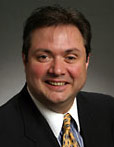|
|
|
FDIC Shuts Down NetBank Due to Defaults
Breaking Legal News |
2007/09/28 16:24
|
| NetBank Inc., an online bank with $2.5 billion in assets, was shut down by the government on Friday because of an excessive level of mortgage defaults. It was the largest savings and loan failure since the tail end of the industry's crisis more than 14 years ago. Federal regulators appointed the Federal Deposit Insurance Corp. as a receiver for Alpharetta, Ga.-based NetBank. Customers with less than $100,000 deposited with NetBank will be protected by FDIC insurance. While dozens of mortgage companies have closed due to soaring defaults of home loans made to borrowers with weak, or subprime, credit, those problems previously had occurred among non-bank lenders such as New Century Financial Corp. NetBank, in contrast, is federally regulated. Loose mortgage standards in recent years - especially among lenders catering to subprime borrowers - have resulted in a spike in home loan defaults. Bert Ely, a banking consultant based in Alexandria, Va., said NetBank was in "deep trouble" before the subprime mortgage market's woes accelerated this year. Regulators, he said, "should have closed it a long time ago." While some Internet-only banks are successful, he said, operating one without retail branches can be a difficult strategy to maintain. |
|
|
|
|
|
|
Qualcomm Hires Apple Lawyer; Apple Taps Oracle Lawyer
Business |
2007/09/28 16:23
|
| Qualcomm Inc., the second-biggest maker of chips that run mobile phones, named Apple Inc. general counsel Donald Rosenberg as its new top lawyer to help defend a series of patent and antitrust lawsuits against the company. Apple also said today it was hiring Oracle Corp.'s Daniel Cooperman to replace Rosenberg, who'd been at Apple less than a year. "It seems unusual to move so quickly and move from such a successful company to such a troubled one," said Rees Morrison, of legal consultant Hildebrandt International, of the Qualcomm hiring. Qualcomm had been looking to fill the general counsel post, the top in-house company lawyer, after previous top lawyer Lou Lupin quit last month. The San Diego-based company, ensnarled in patent litigation with Nokia Oyj and competitor Broadcom Corp., suffered several litigation setbacks earlier this year. In June, the International Trade Commission ordered an import ban on newer models of phones that run on Qualcomm chips because the chips infringe a Broadcom patent. The ruling, which threatened to prevent phone companies from introducing new models for the holiday season, was put on hold earlier this month by an appeals court. In August, a federal judge ruled Qualcomm intentionally infringed Irvine, California-based Broadcom's patents and ordered Qualcomm to pay twice as much in damages as originally ordered. Evidence Another court ruled Qualcomm withheld evidence in a separate lawsuit and that former company attorneys could face possible fines or sanctions for what that judge called an "organized program of litigation misconduct." Earlier this month, a federal appeals court revived a Broadcom antitrust lawsuit accusing Qualcomm of stifling competition for chips. Qualcomm is also embroiled in nearly a dozen legal battles with Finland-based Nokia, the world's biggest maker of mobile phones, over how much Nokia must pay to license Qualcomm's patents for the newest generation of phones with faster Internet access. Earlier this month, the ITC said it would investigate patent-infringement claims by Nokia against Qualcomm. After Lupin resigned in August for what Qualcomm called "personal" reasons, Carol Lam, previously the San Diego U.S. attorney, replaced him on an interim basis. Apple Rosenberg, 56, joins Qualcomm after working at Cupertino, California-based Apple for less than a year. He joined Apple last November after former General Counsel Nancy Heinen left in May 2006. She was sued by the Securities and Exchange Commission for her alleged role in improperly backdating stock-option grants. Rosenberg, who will join Qualcomm Oct. 8, was previously general counsel at International Business Machines Corp. Rosenberg will be replaced by Oracle's Cooperman, who will also hold the titles of senior vice president and secretary. Cooperman joined Apple Nov. 1 from Oracle. "He has experience as a legal strategist in so many areas, including antitrust, regulatory and IP," said Qualcomm spokeswoman Emily Kilpatrick. Apple spokeswoman Susan Lundgren declined to comment. Oracle's Bob Wynne didn't return a call seeking comment. Texas Instruments Inc. is the biggest mobile-phone chipmaker. Qualcomm shares rose 3 cents to $42.26 in Nasdaq Stock Market composite trading. |
|
|
|
|
|
|
McDermott Ranked Among Leading Corporate Transaction Firms
Law Firm News |
2007/09/28 12:46
|

McDermott Will & Emery is ranked among the leading transactional law firms in a first-of-kind report, Law Firm Leaders and Contenders in the Corporate Transactions Market, just released by BTI Consulting. McDermott, an international law firm with more than 1,100 lawyers, ranked among the top nine firms overall and was identified as a "major player" among transactional law firms for both domestic and cross-border transactions.From its global platform, McDermott offers a broad array of transactional services through globally integrated teams with experience in M&A, tax, labor/benefits, intellectual property, regulatory matters and disputes. The study mentioned McDermott as among an "elite group of law firms [that] shine in international transactions." According to BTI, McDermott is identified by clients as a "top hiring choice" for international transactions. "Whether a transaction is large or small, domestic or international, it requires a breadth of skills and experience to manage efficiently and close successfully," stated Harvey Freishtat, Firm Chairman. "Companies are increasingly looking for teams that understand the client's business goals and execute flawlessly. I am particularly pleased with our recognition in Europe as well as the United States." Timothy Alvino, co-head of the Firm’s Corporate Department added: "McDermott is particularly well suited to meet a company’s transactional needs, because we have premier practice groups in such areas as corporate, finance, benefits, intellectual property, antitrust and tax. These groups function as integrated deal teams across our platform and link with sector-based teams across a broad range of industries. This combination of strong subspecialty skill and in-depth industry knowledge provides clients superior levels of competence, practical business sense and service." "We have an international platform that has the resources, talent and geographic reach to service multinational and other corporations and financial institutions who operate in the key global economic centers," added David Dalgarno, head of the Firm's London office. "With a proven track record for project management, we have experience in a wide variety of sectors encompassing traditional 'old' economies and the new high tech economies worldwide." McDermott completed nearly 100 M&A transactions in 2006 according to Mergerstat, an industry data provider. The Firm's M&A practice is recognized worldwide, placing in the top 20 in several deal tables in 2006 and 2007 by Bloomberg (Global Legal M&A and Global Financial M&A), Thomson Financial (Worldwide Rankings for M&A/Legal Advisors and Americas Rankings for M&A/Legal Advisors) and Mergermarket (Global M&A, North American M&A, Global Top Deals and North America Top Deals for YTD 2007). During 2007, the Firm has completed nearly 85 M&A transactions, and was recognized for its involvement in the top ten U.S. deals announced by Thomson Financial through June 2007. McDermott played a key role in three of the 10 largest deals, including the leveraged buyout of TXU and the spinoffs of Tyco Electronics and the Tyco Healthcare Group. BTI conducted more than 150 independent interviews with corporate counsel responsible for transactions at large and Fortune 1000 companies. BTI selected companies active in the deal markets with revenue in excess of $1 billion across 14 industries. For more information visit www.bticonsulting.com. |
|
|
|
|
|
|
Wayne Johnson Appointed Chair-Elect of CA's Bar Tax Section
Attorneys in the News |
2007/09/28 12:13
|
| Valensi Rose, PLC is pleased to announce that Wayne R. Johnson has been appointed chair-elect of the California State Bar's Taxation Section Executive Committee. His term as chair-elect will run from September 30, 2007 through September 28, 2008, at which time he will become chair of the Taxation Section. "I'm truly honored to have been appointed to this position, and I hope it will allow me to promote the Section's interests even more," said Johnson, a partner at Valensi Rose. "I believe strongly in the Section's purpose and goals, and look forward to the opportunity to continue my service to the Taxation Section." "The firm has always encouraged active involvement in the community, from nonprofits to public policy," said Arlen Gunner, managing partner of Valensi Rose. "We congratulate Wayne on his appointment, and applaud him for continuing our firm's dedication to the community and to the profession." The Taxation Section is California's only statewide tax bar association. The Taxation Section's current membership is approximately 3,000. In addition to his involvement with the California Taxation Section, Johnson currently serves as Chairman of the Board of the Los Angeles Chapter of The Make-A-Wish Foundation. Johnson represents high net-worth individuals in planning their business and personal affairs. Prior to practicing law, Johnson was a public accountant. He holds a masters' degree in taxation law from New York University School of Law. Johnson earned his law degree from the University of North Dakota School of Law. Law and Politics Magazine and Los Angeles Magazine named Johnson a "Rising Star" among Southern California lawyers in each of 2004, 2005 and 2006. The Rising Star designation is awarded to attorneys who are 40 years of age and under - or have been practicing law for 10 years or less - who have shown themselves to be among the very best young lawyers practicing in Southern California. Johnson is one of only a hand-full of Southern California tax attorneys to be awarded this distinction. |
|
|
|
|
|
|
Freddie Mac, SEC settle accounting fraud charges
Breaking Legal News |
2007/09/28 07:57
|
| Giant mortgage-buyer Freddie Mac will pay a $50 million fine to securities regulators to settle charges it manipulated earnings for three years, the Securities and Exchange Commission said Thursday. Four former Freddie executives will also pay nearly $800,000 in penalties, the SEC said. Neither the company nor the executives admitted or denied the U.S. allegations. The SEC's complaint says Freddie Mac misreported its net income in 2000, 2001 and 2002. In a press release, the SEC said the company improperly managed earnings beginning as early as 1998. "Freddie Mac's departure from proper accounting practices was the result of a corporate culture that sought stable earnings growth at any cost," said Linda Thomsen, the SEC's enforcement director, in a statement. The SEC said it expects to distribute the penalty money to investors. Freddie Mac has taken a number of steps to bolster its accounting practices. On Thursday, Freddie's chief executive, Richard Syron, said the agreement resolves the last investigation related to its earnings restatement. "This is another milestone enabling us to focus entirely on those things that are most important -- further advancing our housing mission, effectively serving our customers and building our business for the future," Syron said.
|
|
|
|
|
|
|
Supreme Court Spares Texas Killer
Court Watch |
2007/09/28 07:47
|
| The U.S. Supreme Court halted the execution of a man convicted of killing his parents in the nation's busiest death penalty state after already agreeing to review another state's lethal injection procedures. The high court, which refused a similar appeal earlier this week from another Texas inmate, blocked state corrections officials Thursday night from executing 28-year-old Carlton Turner Jr. The order came less than two hours before the death warrant would have expired at midnight. Turner's lawyers had linked his case with an appeal from two Kentucky inmates who argued that lethal injection is unconstitutionally cruel. Both states use similar injection procedures employing three drugs. The justices on Tuesday agreed to consider the Kentucky appeal, and Turner's case was viewed as a barometer of whether capital punishment in Texas could be placed on hold while the Supreme Court considers that case. |
|
|
|
|
|
|
'Jena 6' teen Mychal Bell freed on bail
Breaking Legal News |
2007/09/28 07:43
|
| Mychal Bell walked out of jail yesterday, a week after a huge civil rights march demanding his freedom, but the prosecutor worsened racial tensions by declaring that Jesus saved the town from protestors. "Had it not been for the direct intervention of the Lord Jesus Christ last Thursday, a disaster would have happened," District Attorney Reed Walters said. "You can quote me on that." Walters spoke just before Bell, 17, was freed on $45,000 bail after spending 10 months in jail for beating a white classmate. "He goes home because a lot of people left their home and stood up for him," said the Rev. Al Sharpton, referring to the Sept.20 march. "We do not condone violence of any kind. ... Upon this young man's shoulders is a movement for fairness." His parents at his side, Bell, who did not speak, walked out of the LaSalle Parish courthouse, flanked also by Martin Luther King 3rd and Sharpton, who recently supplanted less media-savvy local activists to become Bell's spokesman. An all-white jury convicted Bell after his court-appointed lawyer failed to question any witnesses. The conviction was thrown out this month when an appeals court said he should not have been tried as an adult. Walters, who is being accused of treating black offenders more harshly than white ones, said he decided not to appeal the ruling. He said he would retry the case in juvenile court as soon as possible. "I believe that it is in the best interest of the victim and his family not to delay this matter any further," he said. Walters charged Bell and five black friends - known as the Jena 6 - with attempted murder last year for punching and stomping white classmate Justin Barker after a series of ugly racial incidents in town. Walters later reduced the charge to aggravated battery, which could still put the teens in prison for 20 years. |
|
|
|
|
|
|
Class action or a representative action is a form of lawsuit in which a large group of people collectively bring a claim to court and/or in which a class of defendants is being sued. This form of collective lawsuit originated in the United States and is still predominantly a U.S. phenomenon, at least the U.S. variant of it. In the United States federal courts, class actions are governed by Federal Rules of Civil Procedure Rule. Since 1938, many states have adopted rules similar to the FRCP. However, some states like California have civil procedure systems which deviate significantly from the federal rules; the California Codes provide for four separate types of class actions. As a result, there are two separate treatises devoted solely to the complex topic of California class actions. Some states, such as Virginia, do not provide for any class actions, while others, such as New York, limit the types of claims that may be brought as class actions. They can construct your law firm a brand new website and help you redesign your existing law firm site to secure your place in the internet. |
Law Firm Directory
|
|











